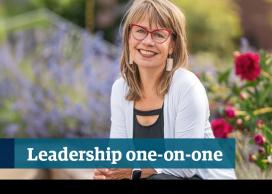Dr. Bhushan Gopaluni is the Vice-Provost and Associate Vice-President of Faculty Planning at UBC Vancouver. He was appointed in May 2023, following one year in a pro tem capacity. In this role, he leads on enrolment planning, stewardship of academic space and capital projects, and university budget planning.
Dr. Gopaluni has held several roles at the university. He joined the Faculty of Applied Science in 2006 as an assistant professor in the Department of Chemical and Biological Engineering. Prior to his current role, he was Associate Head for undergraduate programs, followed by Associate Dean of Education and Professional Development.
A leading expert on data analytics for the process industry, Dr. Gopaluni is the recipient of the prestigious Killam Teaching Prize, the Applied Science Dean’s service medal and the D.G. Fisher Award in Process Control from the Canadian Society for Chemical Engineering. One of his proudest achievements was launching the Applied Science Experiential Learning Hub, which is designed to give students an edge in a constantly evolving job market.
Q1. What quality do you most admire in a leader?
BG: While I had never planned to be in a leadership role, I’ve always been fascinated with leadership styles. I enjoy reading books by authors such as Daniel Goleman, who states that truly effective leaders are distinguished by a high degree of emotional intelligence.
During my career, I have learned that success in leadership is very simple. Leaders must be down to earth, show humility, listen to people and show extreme patience. These are the qualities that have helped me most in leadership roles. The most effective leaders I’ve experienced always try to find a win-win situation when making decisions around complex issues.
Q2. What makes you laugh?
BG: A good joke, especially when it’s laced with the self-deprecating wit characteristic of British humour. Sharing jokes in my classroom is something I relish, and I enjoy observing the irony that unfolds in daily life.
Q3. Who inspires you, and why?
BG: Many individuals spark inspiration in me, spanning from world-class athletes, renowned scientists, notable historical figures to people I meet in everyday life. The tenacity and grit in world-class players, the humility and drive to serve society in leaders, and the passion for innovation in scientists, have all inspired me at different stages of my life.
Q4. For you, what makes UBC different?
BG: The people set UBC apart. We have some of the best faculty members, brightest students and amazing staff which makes it one of the greatest places to be educated. Additionally, our world-class facilities position us as a premier educational institution.
Q5. What is the most important lesson you’ve learned, in your career to date?
BG: I’ve learned to ask for help when you need it because there are a lot of supportive and intelligent people around. Without asking for help, you are going to stunt your own ability to grow and develop.
Also, I’ve learned to offer help and not to expect anything in return. One of my favourite authors on organizational psychology is Adam Grant, who says: “The most meaningful way to succeed is to help others succeed.”
I’m also a proponent of Cal Newport’s theory that, instead of trying to follow our passion, we should follow our curiosity to find our passion. That’s how my career evolved.
I always tell my children that it’s important to volunteer for opportunities that come their way. The same applies to leaders; get involved in a wide range of activities because it leads to more doors opening, expands your network and gives you increased visibility, which leads to new opportunities knocking on your door.
Q6. How do you like to recharge?
BG: I enjoy hiking, skiing or watching movies with my family.
Q7. What is the best advice you were ever given?
BG: When I was a PhD student, my professor used to always carry a book. He said: “You should never stop reading.” That was such a valuable piece of advice. Lifelong learning is important.
Q8. What do you value in your colleagues?
BG: I value the friendly and helpful nature of my colleagues. I’m also struck by how intelligent the people around me are. It’s a blessing to work in such an environment. I learn something new during every conversation and meeting I have.
Q9. What do you hope will be your lasting impact at UBC?
BG: From a research standpoint, I would like UBC to be known as one of the top places in the world for research and innovation in industrial automation. And in my capacity as a leader, I am committed to enhancing the effectiveness of our admissions process.
Q10. If you could have a super power, what would it be?
BG: I would create more hours in the day to work on my various projects and help people achieve their best potential.
Q11. As head of research activities at the UBC DAIS Lab, and a member of the Generative AI Steering Committee, how do you see artificial intelligence and machine learning impacting the evolution of teaching practices?
BG: I see these tools as having a lot of exciting potential. I do not see them as threat. We need to find ways to effectively use these tools to enhance learning and improve students’ productivity. We don’t know where we are heading, but it seems clear to me that someone is going to use these technologies to disrupt education in the same way that teaching has evolved for centuries. I belive that we could be the disruptors who create a new way to teach students. In fact, it’s more likely that innovations around new ways of teaching students will come from within a university than from outside.
Q12. What is top of mind for you as higher education adjusts and evolves in a post-COVID landscape?
BG: The pandemic was a huge learning for us all. While the COVID-19 restrictions are over, the experience has permanently altered how we offer our classes to students. The data appears to suggest that students are taking fewer courses per term therefore, the existing in-person, hybrid and multi access classes can be expanded upon to offer more options to current and prospective students particularly in Vancouver, who can have such long commute times.
Published: April 1, 2024
Interviewed by: Meadhbh Monahan, UBC Internal Communications



